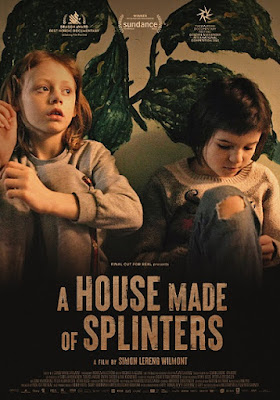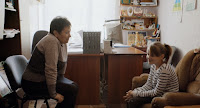It is not like these kids had it easy to begin with. In many cases, their alcoholic parents had yet to inquire regarding their status, even after Ukrainian social services revoked their parental rights. Then their welcoming halfway home in Eastern Ukraine was forced to evacuate when Putin launched his illegal invasion. When the troops crossed the border, filmmaker Simon Lereng Wilmont had already finished shooting his Academy Award-nominated documentary A House Made of Splinters, which airs Monday on PBS stations, as part of the current season of POV.
Unlike Eastern Front and 20 Days in Mariupol, House Made of Splinters is not a war film, but the Russian dirty war in Donbass was indeed stretching Ukraine’s already strained resources for social services. Frankly, the three kids Wilmont focuses on are lucky to be there. Longtime educator/case workers Margaryta Burlutska and Olga Tronova provided a sheltering environment for the children, who were suddenly dealing with abandonment issues on top of everything else.
The Lysychansk Center was sort of a way station. Eventually, their residents either leave for a state-run orphanage or foster parents recruited by Burlutska and Tronova. Generally, fostering is the preferable option, but it essentially means the foster children have given up hope for a further life with their dysfunctional birth parents.
The three focal children all must come to terms with that reality, which is definitely some very real-life drama. It is also very depressing. However, thanks to Burlutska and Tronova, some of the kids have relatively happy endings—at least until the Russians invade.
One could argue House Made of Splinters is not really driven by narrative, even though it documents several turning points in the lives of Lysychansk children. There is no explosive culmination like in 20 Days. Everyone just keeps enduring. Yet, throughout Wilmont’s doc, viewers must constantly remind themselves that everything will get much worse for everyone.
It is also important to keep in mind Burlutska and Tronova represent a progressive reformist impulse in Ukraine. Frankly, Ukraine never fully recovered from its years of Soviet captivity, thanks to some dubious political leadership (particularly the Russian aligned Yanukovych), but people like the Lysychansk teachers were trying to improve the outlook for some of Ukraine’s most marginalized kids. Respectfully recommended for viewers interested in Ukrainian society, A House Made of Splinters airs this Monday (6/17) on most PBS outlets.

